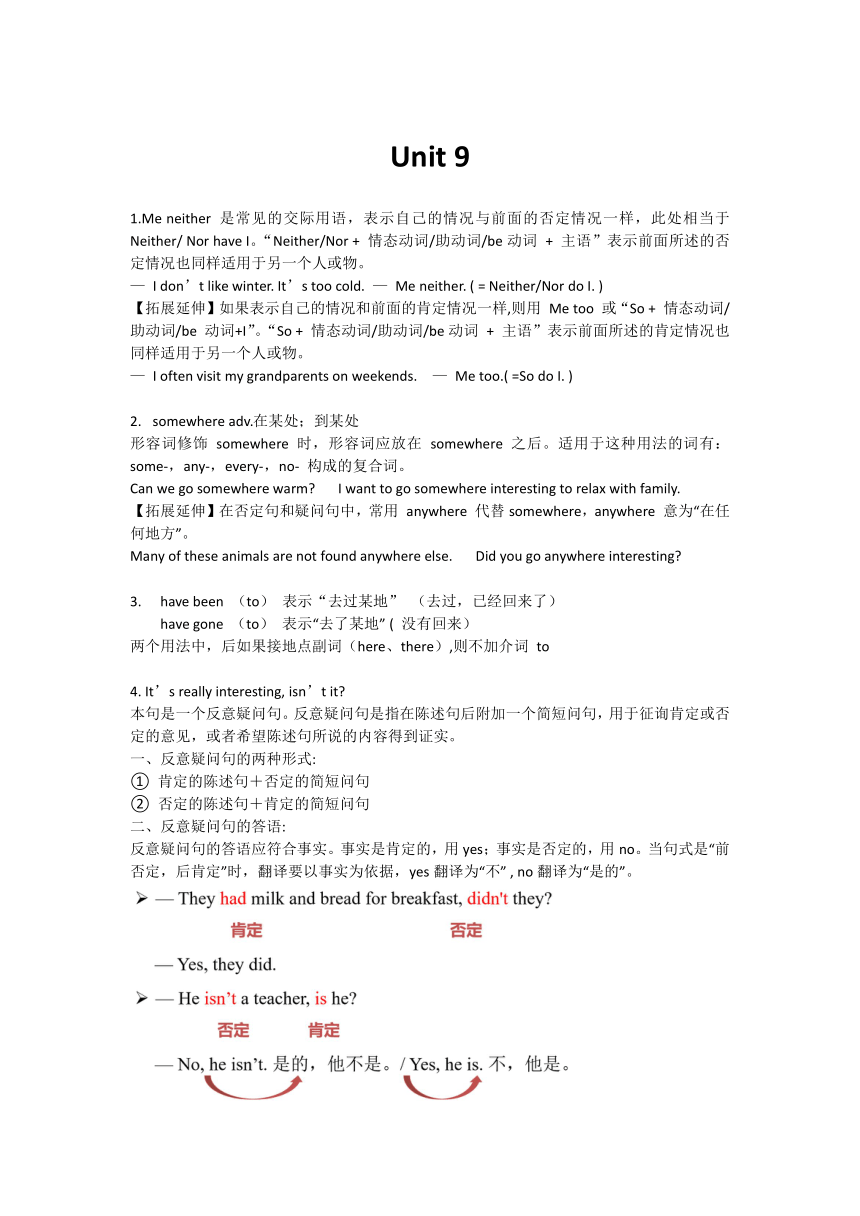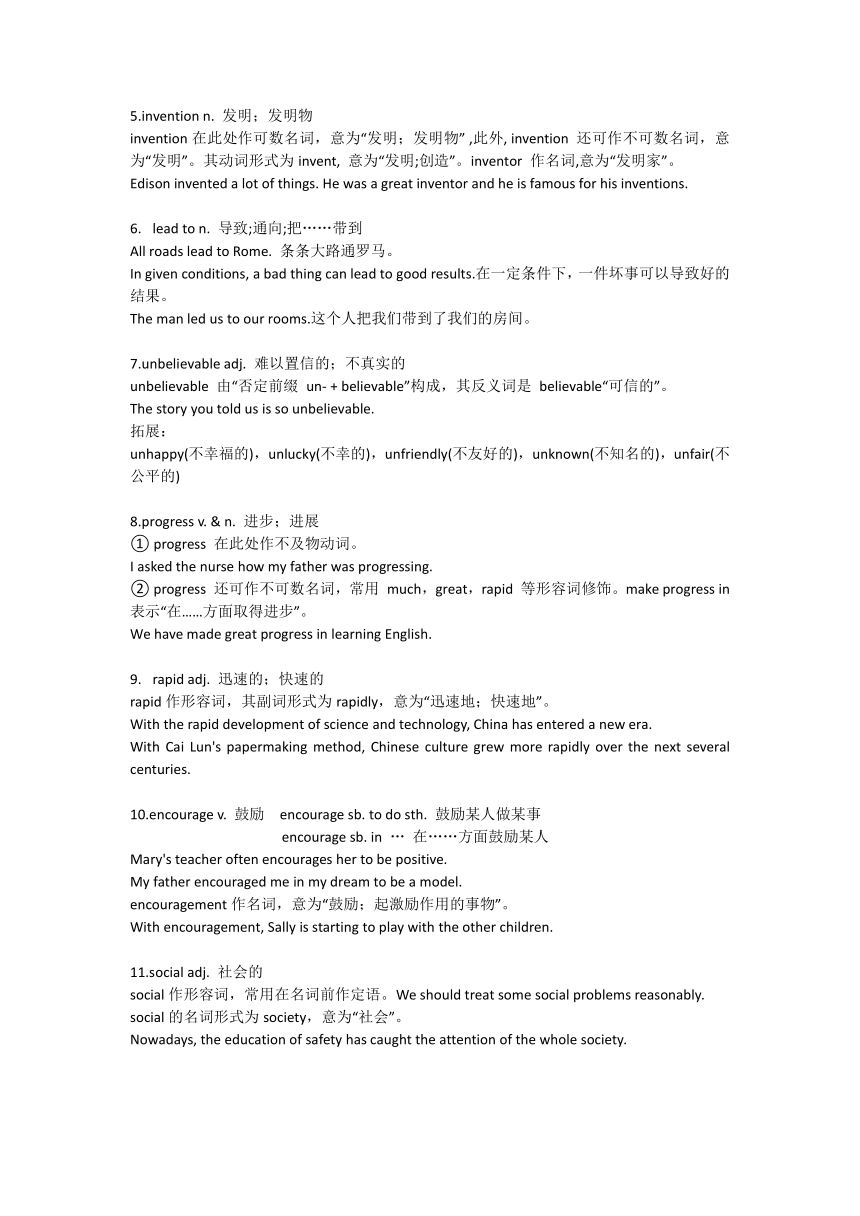2021-2022学年人教版八年级英语下册Unit 9 Have you ever been to a museum? 单元笔记
文档属性
| 名称 | 2021-2022学年人教版八年级英语下册Unit 9 Have you ever been to a museum? 单元笔记 |  | |
| 格式 | zip | ||
| 文件大小 | 66.9KB | ||
| 资源类型 | 教案 | ||
| 版本资源 | 人教新目标(Go for it)版 | ||
| 科目 | 英语 | ||
| 更新时间 | 2022-05-16 20:17:42 | ||
图片预览


文档简介
Unit 9
1.Me neither 是常见的交际用语,表示自己的情况与前面的否定情况一样,此处相当于 Neither/ Nor have I。“Neither/Nor + 情态动词/助动词/be动词 + 主语”表示前面所述的否定情况也同样适用于另一个人或物。
— I don’t like winter. It’s too cold. — Me neither. ( = Neither/Nor do I. )
【拓展延伸】如果表示自己的情况和前面的肯定情况一样,则用 Me too 或“So + 情态动词/助动词/be 动词+I”。“So + 情态动词/助动词/be动词 + 主语”表示前面所述的肯定情况也同样适用于另一个人或物。
— I often visit my grandparents on weekends. — Me too.( =So do I. )
somewhere adv.在某处;到某处
形容词修饰 somewhere 时,形容词应放在 somewhere 之后。适用于这种用法的词有:some-,any-,every-,no- 构成的复合词。
Can we go somewhere warm I want to go somewhere interesting to relax with family.
【拓展延伸】在否定句和疑问句中,常用 anywhere 代替somewhere,anywhere 意为“在任何地方”。
Many of these animals are not found anywhere else. Did you go anywhere interesting
have been (to) 表示“去过某地” (去过,已经回来了)
have gone (to) 表示“去了某地” ( 没有回来)
两个用法中,后如果接地点副词(here、there),则不加介词 to
4. It’s really interesting, isn’t it
本句是一个反意疑问句。反意疑问句是指在陈述句后附加一个简短问句,用于征询肯定或否定的意见,或者希望陈述句所说的内容得到证实。
一、反意疑问句的两种形式:
① 肯定的陈述句+否定的简短问句
② 否定的陈述句+肯定的简短问句
二、反意疑问句的答语:
反意疑问句的答语应符合事实。事实是肯定的,用yes;事实是否定的,用no。当句式是“前否定,后肯定”时,翻译要以事实为依据,yes翻译为“不” , no翻译为“是的”。
5.invention n. 发明;发明物
invention在此处作可数名词,意为“发明;发明物” ,此外, invention 还可作不可数名词,意为“发明”。其动词形式为invent, 意为“发明;创造”。inventor 作名词,意为“发明家”。
Edison invented a lot of things. He was a great inventor and he is famous for his inventions.
lead to n. 导致;通向;把……带到
All roads lead to Rome. 条条大路通罗马。
In given conditions, a bad thing can lead to good results.在一定条件下,一件坏事可以导致好的结果。
The man led us to our rooms.这个人把我们带到了我们的房间。
7.unbelievable adj. 难以置信的;不真实的
unbelievable 由“否定前缀 un- + believable”构成,其反义词是 believable“可信的”。
The story you told us is so unbelievable.
拓展:
unhappy(不幸福的),unlucky(不幸的),unfriendly(不友好的),unknown(不知名的),unfair(不公平的)
8.progress v. & n. 进步;进展
① progress 在此处作不及物动词。
I asked the nurse how my father was progressing.
② progress 还可作不可数名词,常用 much,great,rapid 等形容词修饰。make progress in 表示“在……方面取得进步”。
We have made great progress in learning English.
rapid adj. 迅速的;快速的
rapid作形容词,其副词形式为rapidly,意为“迅速地;快速地”。
With the rapid development of science and technology, China has entered a new era.
With Cai Lun's papermaking method, Chinese culture grew more rapidly over the next several centuries.
10.encourage v. 鼓励 encourage sb. to do sth. 鼓励某人做某事
encourage sb. in … 在……方面鼓励某人
Mary's teacher often encourages her to be positive.
My father encouraged me in my dream to be a model.
encouragement作名词,意为“鼓励;起激励作用的事物”。
With encouragement, Sally is starting to play with the other children.
11.social adj. 社会的
social作形容词,常用在名词前作定语。We should treat some social problems reasonably.
social的名词形式为society,意为“社会”。
Nowadays, the education of safety has caught the attention of the whole society.
12.collect v. 收集;采集 collection n. 收藏;收藏品 collector n. 收藏家
I like collecting stamps while my brother likes collecting coins.
The famous collector has collected many things in the past fifty years. His collections are priceless.
On the other hand 一方面……另一方面……
on the one hand... on the other hand... 常用于列举原因、情况等,说明一个事物的两个方面。有时 on the other hand也可单独使用。
On the one hand, teachers should take good care of the students; on the other hand, students should respect their teachers.
14分数的表达法
three quarters 意为“四分之三”。分数在英语中通常借助基数词和序数词来共同表达。其中分子常用基数词,分母用序数词。如果分子大于1,分母要用复数形式。
三分之二 two thirds
十分之一 a/one tenth
15.simply adv. 仅仅;只;不过
simply 在此处相当于 just 或 only。 Simply add hot water and stir.
【拓展延伸】simply 还有“简单地;简朴地”的意思。simple 作形容词,意为“简单的;容易的”。
The book explains grammar simply and clearly.
They live simply.
The machine is very simple to use.
fear v. & n. 害怕;惧怕
① fear 在此处作及物动词,意为“害怕;惧怕”,相当于be afraid of。
Children usually fear to go out alone at night.
He fears that he may lose his job, so he works hard every day.
② fear 还可作名词,意为“害怕;惧怕” 。be in fear of “害怕……;担心……”。
Don't let a little fear stop you from getting what you want.
We are in fear of tigers.
17.whether conj. 不管……(还是);或者……(或者);是否
①在此处 whether 作连词,常与 or 连用,意为“不管……(还是);或者……(或者)”,引导让步状语从句。
Whether the news is true or not, you should be prepared.
② whether 作连词,还可意为“是否”,引导宾语从句(名词从句)。
My deskmate asked me whether I needed any help.
18.whenever conj. 在任何……的时候;无论何时
whenever 作连词,此处引导让步状语从句,相当于 no matter when。与其用法相似的还有:
whatever = no matter what 无论什么
whichever = no matter which 无论哪一 个
wherever = no matter where 无论在哪里
whoever = no matter who 无论谁
however = no matter how 无论如何
Whenever/No matter when it happened, it was certainly not last Friday.
The quality is the same, whichever of them you choose.
Whoever/No matter who you are, you must obey the school rules.
【拓展延伸】whenever还可意为“每当;每次”,此时用来引导时间状语从句。
Miss Chan is very patient. Whenever we ask questions in class, she explains to us very carefully.
1.Me neither 是常见的交际用语,表示自己的情况与前面的否定情况一样,此处相当于 Neither/ Nor have I。“Neither/Nor + 情态动词/助动词/be动词 + 主语”表示前面所述的否定情况也同样适用于另一个人或物。
— I don’t like winter. It’s too cold. — Me neither. ( = Neither/Nor do I. )
【拓展延伸】如果表示自己的情况和前面的肯定情况一样,则用 Me too 或“So + 情态动词/助动词/be 动词+I”。“So + 情态动词/助动词/be动词 + 主语”表示前面所述的肯定情况也同样适用于另一个人或物。
— I often visit my grandparents on weekends. — Me too.( =So do I. )
somewhere adv.在某处;到某处
形容词修饰 somewhere 时,形容词应放在 somewhere 之后。适用于这种用法的词有:some-,any-,every-,no- 构成的复合词。
Can we go somewhere warm I want to go somewhere interesting to relax with family.
【拓展延伸】在否定句和疑问句中,常用 anywhere 代替somewhere,anywhere 意为“在任何地方”。
Many of these animals are not found anywhere else. Did you go anywhere interesting
have been (to) 表示“去过某地” (去过,已经回来了)
have gone (to) 表示“去了某地” ( 没有回来)
两个用法中,后如果接地点副词(here、there),则不加介词 to
4. It’s really interesting, isn’t it
本句是一个反意疑问句。反意疑问句是指在陈述句后附加一个简短问句,用于征询肯定或否定的意见,或者希望陈述句所说的内容得到证实。
一、反意疑问句的两种形式:
① 肯定的陈述句+否定的简短问句
② 否定的陈述句+肯定的简短问句
二、反意疑问句的答语:
反意疑问句的答语应符合事实。事实是肯定的,用yes;事实是否定的,用no。当句式是“前否定,后肯定”时,翻译要以事实为依据,yes翻译为“不” , no翻译为“是的”。
5.invention n. 发明;发明物
invention在此处作可数名词,意为“发明;发明物” ,此外, invention 还可作不可数名词,意为“发明”。其动词形式为invent, 意为“发明;创造”。inventor 作名词,意为“发明家”。
Edison invented a lot of things. He was a great inventor and he is famous for his inventions.
lead to n. 导致;通向;把……带到
All roads lead to Rome. 条条大路通罗马。
In given conditions, a bad thing can lead to good results.在一定条件下,一件坏事可以导致好的结果。
The man led us to our rooms.这个人把我们带到了我们的房间。
7.unbelievable adj. 难以置信的;不真实的
unbelievable 由“否定前缀 un- + believable”构成,其反义词是 believable“可信的”。
The story you told us is so unbelievable.
拓展:
unhappy(不幸福的),unlucky(不幸的),unfriendly(不友好的),unknown(不知名的),unfair(不公平的)
8.progress v. & n. 进步;进展
① progress 在此处作不及物动词。
I asked the nurse how my father was progressing.
② progress 还可作不可数名词,常用 much,great,rapid 等形容词修饰。make progress in 表示“在……方面取得进步”。
We have made great progress in learning English.
rapid adj. 迅速的;快速的
rapid作形容词,其副词形式为rapidly,意为“迅速地;快速地”。
With the rapid development of science and technology, China has entered a new era.
With Cai Lun's papermaking method, Chinese culture grew more rapidly over the next several centuries.
10.encourage v. 鼓励 encourage sb. to do sth. 鼓励某人做某事
encourage sb. in … 在……方面鼓励某人
Mary's teacher often encourages her to be positive.
My father encouraged me in my dream to be a model.
encouragement作名词,意为“鼓励;起激励作用的事物”。
With encouragement, Sally is starting to play with the other children.
11.social adj. 社会的
social作形容词,常用在名词前作定语。We should treat some social problems reasonably.
social的名词形式为society,意为“社会”。
Nowadays, the education of safety has caught the attention of the whole society.
12.collect v. 收集;采集 collection n. 收藏;收藏品 collector n. 收藏家
I like collecting stamps while my brother likes collecting coins.
The famous collector has collected many things in the past fifty years. His collections are priceless.
On the other hand 一方面……另一方面……
on the one hand... on the other hand... 常用于列举原因、情况等,说明一个事物的两个方面。有时 on the other hand也可单独使用。
On the one hand, teachers should take good care of the students; on the other hand, students should respect their teachers.
14分数的表达法
three quarters 意为“四分之三”。分数在英语中通常借助基数词和序数词来共同表达。其中分子常用基数词,分母用序数词。如果分子大于1,分母要用复数形式。
三分之二 two thirds
十分之一 a/one tenth
15.simply adv. 仅仅;只;不过
simply 在此处相当于 just 或 only。 Simply add hot water and stir.
【拓展延伸】simply 还有“简单地;简朴地”的意思。simple 作形容词,意为“简单的;容易的”。
The book explains grammar simply and clearly.
They live simply.
The machine is very simple to use.
fear v. & n. 害怕;惧怕
① fear 在此处作及物动词,意为“害怕;惧怕”,相当于be afraid of。
Children usually fear to go out alone at night.
He fears that he may lose his job, so he works hard every day.
② fear 还可作名词,意为“害怕;惧怕” 。be in fear of “害怕……;担心……”。
Don't let a little fear stop you from getting what you want.
We are in fear of tigers.
17.whether conj. 不管……(还是);或者……(或者);是否
①在此处 whether 作连词,常与 or 连用,意为“不管……(还是);或者……(或者)”,引导让步状语从句。
Whether the news is true or not, you should be prepared.
② whether 作连词,还可意为“是否”,引导宾语从句(名词从句)。
My deskmate asked me whether I needed any help.
18.whenever conj. 在任何……的时候;无论何时
whenever 作连词,此处引导让步状语从句,相当于 no matter when。与其用法相似的还有:
whatever = no matter what 无论什么
whichever = no matter which 无论哪一 个
wherever = no matter where 无论在哪里
whoever = no matter who 无论谁
however = no matter how 无论如何
Whenever/No matter when it happened, it was certainly not last Friday.
The quality is the same, whichever of them you choose.
Whoever/No matter who you are, you must obey the school rules.
【拓展延伸】whenever还可意为“每当;每次”,此时用来引导时间状语从句。
Miss Chan is very patient. Whenever we ask questions in class, she explains to us very carefully.
同课章节目录
- Unit 1 What's the matter?
- Section A
- Section B
- Unit 2 I'll help to clean up the city parks.
- Section A
- Section B
- Unit 3 Could you please clean your room?
- Section A
- Section B
- Unit 4 Why don't you talk to your parents?
- Section A
- Section B
- Unit 5 What were you doing when the rainstorm came
- Section A
- Section B
- Review of Units 1-5
- Unit 6 An old man tried to move the mountains.
- Section A
- Section B
- Unit 7 What's the highest mountain in the world?
- Section A
- Section B
- Unit 8 Have you read Treasure Island yet?
- Section A
- Section B
- Unit 9 Have you ever been to a museum?
- Section A
- Section B
- Unit 10 I've had this bike for three years.
- Section A
- Section B
